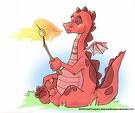
Last week, on Worldbuilding Wednesday, we looked at Community Interaction, specifically with language and its usage.
Sometimes words and customs can seep into a society through an unexpected source -- slaves. Slave women often raised the young children of the richer element of the community and inadvertently infiltrated foreign words into their language, as well as stories, and sometimes the ideas of right and wrong. Slaves might also introduce new farming techniques and tools into a settlement. Anything which improves the life of the larger group will likely be kept, including the words. This is a concept Dave Berry used in his prequel to Peter Pan – explaining how these kids were on their own, and, even though they were children, had to adapt quickly to their circumstances and learn about finding shelter and foraging for food. They had their own ways of communicating, choosing a leader (who could spit the farthest) and dealing with circumstances dealt them.
Again, in the concept of language, remember that accents, even when using the same words, can make something nearly incomprehensible from one group to another. This proved true in much of Medieval England, where a person living twenty miles away was considered a foreigner because he talked differently. Words reflect the culture from which they originate. If two cultures overlap, usually through invasion, you might find strange combinations.
Place names can reflect either an older city by the original name, or a new city, founded by the invaders. Also after an invasion there can be a dichotomy in the names of items between natives and the invaders. For instance, Anglo-Saxon peasants raised cattle, but the Norman lords ate beef.
There is a theory that our lives are so conditioned by words that it may be impossible for us to experience something we cannot put a word to. We think in words, so -- if this theory is correct -- the larger a person's vocabulary, the more of the world the person can experience.
A number of fantasy and science fiction writers enjoy creating languages for their new worlds and it can be a lot of fun and a great intellectual game. However, once you begin writing the story, remember not to let the new language take over the story so much that it's impossible for a non-native to understand what's going on. Remember your readers.
The creation of slang is a difficult aspect of language. It can sometimes look stupid when first introduced in a book, but with care can be worked into a story in such a way that the use becomes natural to the reader. Slang should have some real world basis in which it exists. This, in some ways, is much harder to do than creating a language from scratch. Slang has to slide into the language we speak and make some sort of sense -- although you may have to explain it the first time.
Like this post? Tweet it! Go ahead, you know you want to!



























1 comments:
Slang, dialect, and new languages can really work well if used in small amounts. Thanks for another interesting post, Nancy!
Elizabeth
Mystery Writing is Murder
Post a Comment